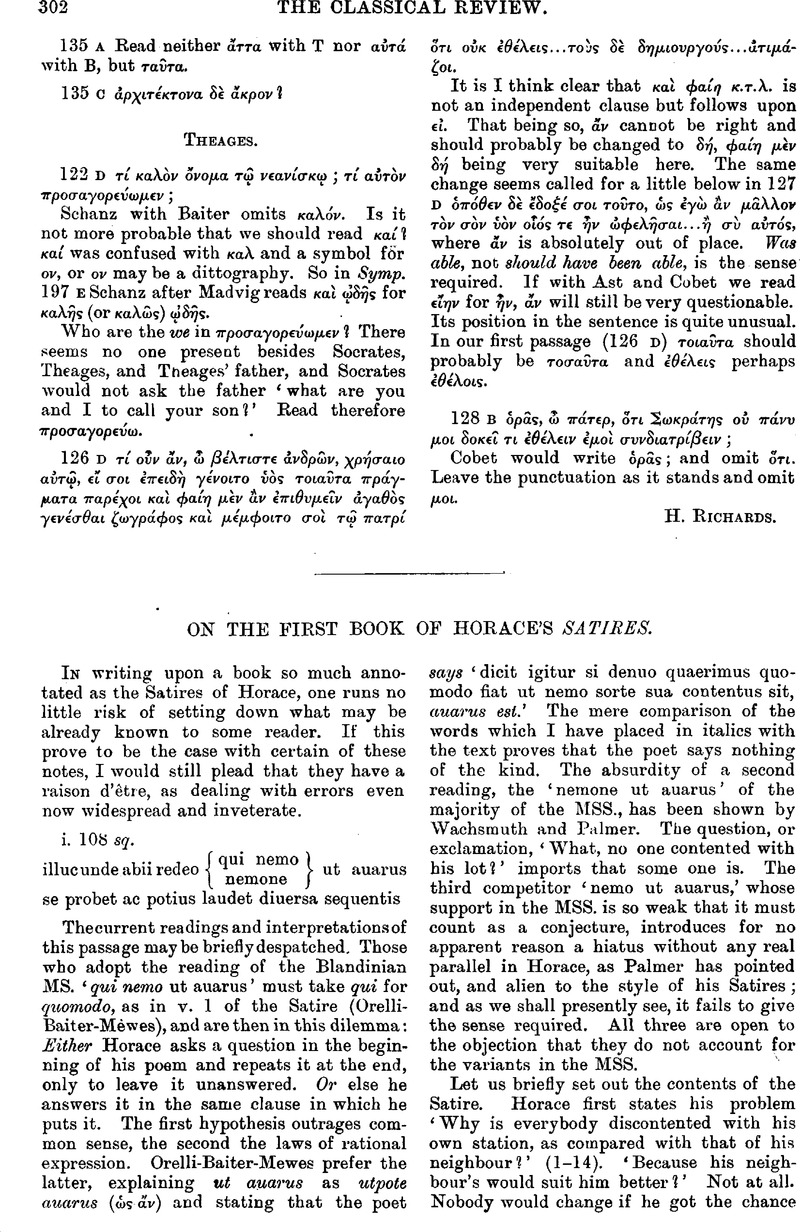No CrossRef data available.
Article contents
On the First Book of Horace's Satires
Published online by Cambridge University Press: 27 October 2009
Abstract

- Type
- Original Contributions
- Information
- Copyright
- Copyright © The Classical Association 1901
References
page 304 note 1 It seems not impossible that the phrase fores obdere is in part an imitation of the Greek ![]() : cf. Plato, Symp. 218 B
: cf. Plato, Symp. 218 B ![]() , Seneca Ep. 31. 2 ‘ad summam sapiens eris si cluseris aures' (the obseratae aures of Horace), quibus ceram parum est obdere. firmiore spissamento opus est quam in sociis usurn Vlixem ferunt.’
, Seneca Ep. 31. 2 ‘ad summam sapiens eris si cluseris aures' (the obseratae aures of Horace), quibus ceram parum est obdere. firmiore spissamento opus est quam in sociis usurn Vlixem ferunt.’
page 305 note 1 Journal of Philology, 1891, p. 288. I learn from Prof. Merrill, who recently proposed the same separation for ‘desurgere’ in Lucretius, American J. of Phil. 1900, p. 185, that the correction is as old as Lambinus. In ‘ tanto emetiris aceruo’ (II ii. 105) however, the abl. depends on the verb: for the compound is. proper in this sense; see Mon. Ancyr. 3. 12.
page 306 note 1 Fea's correction of the MS. fixa seems certain. Compare Prop. 4. 7. 25 ‘nee crepuit fissa me propter harundine custos’ = ![]() Schol. On κρταλθν Ar. Nub. 259 (quoted by Rothstein). In this case the wind served as custos to rattle the harundo.
Schol. On κρταλθν Ar. Nub. 259 (quoted by Rothstein). In this case the wind served as custos to rattle the harundo.
page 306 note 2 qua Bentley, quo MSS.
page 307 note 1 It is not necessary to prove this, but a parallel from a magical scene, iu a poem of T. G. Hake occurs to me while writing. ‘The curious moon, half rising, interweaves In heaven a blood-red ray’ (Palmist).
page 307 note 2 Other editors who misconstrue haberes—uelles or submosses or both are Heindorf, Kirchner, Fritsche, Schütz, Palmer, Kiessling, L. Mueller and Wickham.
The only commentator known to me who has shown that he understood any of these verbs correctly Doederlein who corrects Heindorf's mistake about submosses.
page 308 note 1 Wickham, who rightly says there is a continuous metaphor, quotes Conington's translation ‘gives his Rhine a head-piece of brown mud.’ Conington's ‘brown mud’ reminds us that some commentators (the alii of Orelli-B.-M.) found luteum so puzzling that they must confound it with lūteum and see in it an allusion to the yellow polls of the Germans, Pers. 6. 46.




